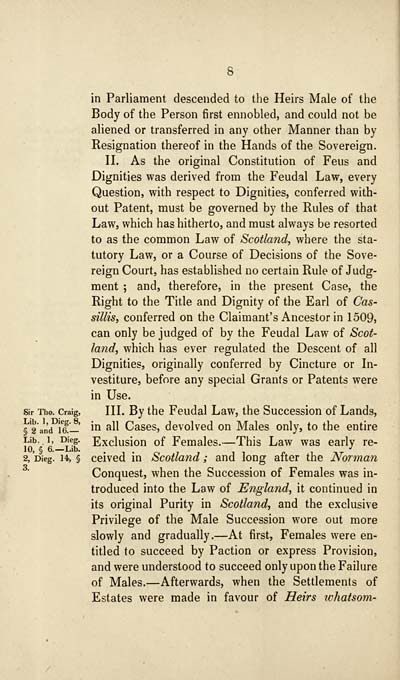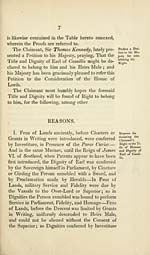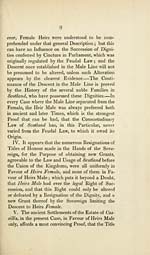Download files
Complete book:
Individual page:
Thumbnail gallery: Grid view | List view

8
in Parliament descended to the Heirs Male of the
Body of the Person first ennobled, and could not be
aliened or transferred in any other Manner than by
Resignation thereof in the Hands of the Sovereign.
II. As the original Constitution of Feus and
Dignities was derived from the Feudal Law, every
Question, with respect to Dignities, conferred with-
out Patent, must be governed by the Rules of that
Law, which has hitherto, and must always be resorted
to as the common Law of Scotland, where the sta-
tutory Law, or a Course of Decisions of the Sove-
reign Court, has established no certain Rule of Judg-
ment ; and, therefore, in the present Case, the
Right to the Title and Dignity of the Earl of Cas-
sillis, conferred on the Claimant's Ancestor in 1509,
can only be judged of by the Feudal Law of Scot-
land, which has ever regulated the Descent of all
Dignities, originally conferred by Cincture or In-
vestiture, before any special Grants or Patents were
in Use.
sir Tho. Craig, III. By the Feudal Law, the Succession of Lands,
§2 and lT— ' m all Cases, devolved on Males only, to the entire
!o b fi-?i/b Exclusion of Females. — This Law was early re-
2, Dieg. 14, § ceived in Scotland ; and long after the Norman
Conquest, when the Succession of Females was in-
troduced into the Law of England, it continued in
its original Purity in Scotland, and the exclusive
Privilege of the Male Succession wore out more
slowly and gradually. — At first, Females were en-
titled to succeed by Paction or express Provision,
and were understood to succeed only upon the Failure
of Males. — Afterwards, when the Settlements of
Estates were made in favour of Heirs ivhatsom-
in Parliament descended to the Heirs Male of the
Body of the Person first ennobled, and could not be
aliened or transferred in any other Manner than by
Resignation thereof in the Hands of the Sovereign.
II. As the original Constitution of Feus and
Dignities was derived from the Feudal Law, every
Question, with respect to Dignities, conferred with-
out Patent, must be governed by the Rules of that
Law, which has hitherto, and must always be resorted
to as the common Law of Scotland, where the sta-
tutory Law, or a Course of Decisions of the Sove-
reign Court, has established no certain Rule of Judg-
ment ; and, therefore, in the present Case, the
Right to the Title and Dignity of the Earl of Cas-
sillis, conferred on the Claimant's Ancestor in 1509,
can only be judged of by the Feudal Law of Scot-
land, which has ever regulated the Descent of all
Dignities, originally conferred by Cincture or In-
vestiture, before any special Grants or Patents were
in Use.
sir Tho. Craig, III. By the Feudal Law, the Succession of Lands,
§2 and lT— ' m all Cases, devolved on Males only, to the entire
!o b fi-?i/b Exclusion of Females. — This Law was early re-
2, Dieg. 14, § ceived in Scotland ; and long after the Norman
Conquest, when the Succession of Females was in-
troduced into the Law of England, it continued in
its original Purity in Scotland, and the exclusive
Privilege of the Male Succession wore out more
slowly and gradually. — At first, Females were en-
titled to succeed by Paction or express Provision,
and were understood to succeed only upon the Failure
of Males. — Afterwards, when the Settlements of
Estates were made in favour of Heirs ivhatsom-
Set display mode to:
![]() Universal Viewer |
Universal Viewer | ![]() Mirador |
Large image | Transcription
Mirador |
Large image | Transcription
Images and transcriptions on this page, including medium image downloads, may be used under the Creative Commons Attribution 4.0 International Licence unless otherwise stated. ![]()
| Histories of Scottish families > Reports of claims preferred to the House of Lords in the cases of the Cassillis, Sutherland, Spynie, and Glencairn peerages > (22) Page 8 |
|---|
| Permanent URL | https://digital.nls.uk/95012166 |
|---|
| Description | A selection of almost 400 printed items relating to the history of Scottish families, mostly dating from the 19th and early 20th centuries. Includes memoirs, genealogies and clan histories, with a few produced by emigrant families. The earliest family history goes back to AD 916. |
|---|

